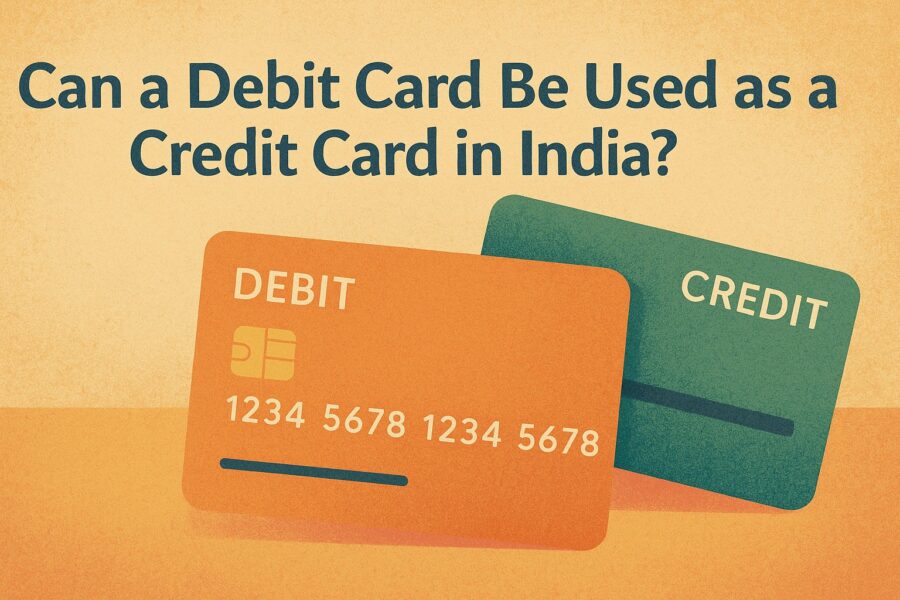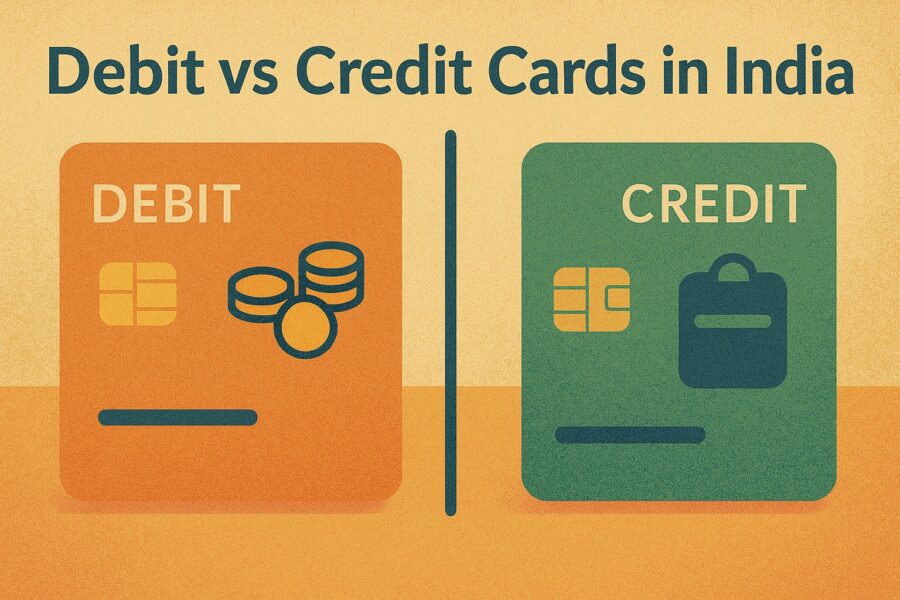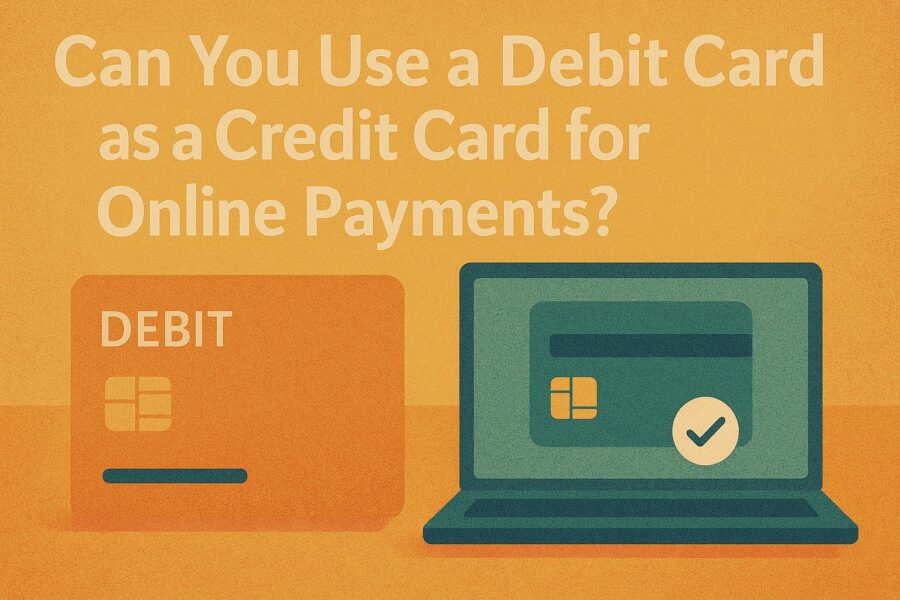Can a Debit Card Be Used as a Credit Card in India?
- 27 Oct 25
- 9 mins

Can a Debit Card Be Used as a Credit Card in India?
Key Takeaways
- While both debit cards and credit cards may carry Visa, Mastercard, or RuPay logos, debit cards draw funds directly from your savings account, whereas credit cards use borrowed money from the bank.
- When you select “credit” at a POS terminal, the transaction is routed through a credit network (like Visa or Mastercard), but the funds still come directly from your bank account.
- Even if a debit card transaction is processed as credit, it does not impact your CIBIL or credit score in India, since you aren’t borrowing money.
- Debit card fraud affects your bank balance instantly, while credit cards offer stronger fraud protection and dispute mechanisms under RBI and network rules.
- To build or improve your credit profile, use beginner-friendly or secured credit cards, take micro-loans, or become an authorised user on another person’s card, not just rely on debit card usage.
Have you ever tried making a payment with your debit card and been asked whether you’d like to pay as “debit” or “credit”? Many Indians face this question while swiping cards at petrol pumps, shopping counters, or even while paying online.
The truth is, your debit card can often work like a credit card during transactions, but the way the money moves behind the scenes is completely different. Understanding this difference can help you make more informed payment choices, minimise unnecessary risks, and manage your spending more effectively.
So, if you have ever wondered can a debit card be used as a credit card, this guide will help you understand the key differences and real implications.
Debit vs Credit Cards in India

Before we explore whether a debit card can be used as a credit card, it's important to understand how both cards actually function in India.
- Debit Card: It is linked to your savings account or current account, and money is automatically deducted whenever you transact business, be it online or offline.
- Credit Card: Operates on a line of credit that your bank provides you with. You use borrowed funds to buy things and pay it back in due course (usually, the upcoming billing cycle).
Although both can include Visa, Mastercard or RuPay logos and are virtually identical, the origin of the funds is what distinguishes them. A credit card spends the money of the bank, and a debit card spends your money. For informational purposes, understanding the key differences between the two helps consumers deal with credit card issuers and financial institutions more confidently.
What Happens When You Select ‘Credit’ with a Debit Card
This is among the most frequent sources of confusion amongst Indian card users. In those situations when you swipe your debit card into a merchant terminal and press the credit option, this is what happens:
- Transaction Processing
Your bank has its debit card network, but instead of sending the transaction directly over that network, the transaction is sent over the credit network of your card, such as Visa or Mastercard. It may take one to three days for the money to be deducted and removed from your account. This process is known as a credit transaction because it routes through the credit network even though you are using your own funds.
- Authorisation
There is no need to insert your PIN. Instead, you may be required to sign the merchant's slip or confirm with an OTP.
- Funds Deduction
The payment is debited directly out of your bank account balance, even though the transaction is still made using a credit network. You do not borrow money in the way you have with a credit card. Still, credit card issuers and financial institutions monitor such transaction trends to enhance user security and reduce unauthorized transactions.
- Merchant Fees
The processing fees borne by merchants are a few cents higher when a customer opts to use a credit card, as this payment is done through a credit card network.
- Liability Protection
Visa, Mastercard and Rupay provide limited zero liability protection on fraudulent transactions. But under the guidelines of RBI this protection is only when you timely report the unauthorised activity to your bank.
So, can a debit card be used as a credit card in India? Technically yes, but only for payment processing, not for borrowing money or building credit.
Why Do Indian Merchants Ask ‘Debit or Credit’?
You may have observed that in India, some stores or petrol pumps will request this question before they process your payment. Here is why:
- Network Routing
The option then decides the network (debit or credit) that will undertake the transaction. Credit networks usually charge merchants a higher fee.
- Speed of Settlement
The settlement of debit transactions will usually be faster and credit-type settlement will be slightly slower.
- Reward Program Differences
Other banks do even better with cashback or reward points when you choose credit, including when using a debit card on a credit network. These reward structures vary between different credit card issuers, who often set their own monthly statement terms and cash advance fee structures.
💡Pay your credit card bills in an easy and secured way with the PICE App.
Can You Use a Debit Card as a Credit Card for Online Payments?

Yes, most of the time Indian debit cards could be treated as credit cards when one goes shopping online. Entering the 16-digit card number, the expiry date and the CVV, the e-commerce sites use the credit network of your card (Visa, Mastercard, or RuPay) to complete the processing of the transaction.
The cash is then immediately withdrawn from your bank account, which has a savings account attached, and not a credit line.
Here is what to remember:
- Always enable the use of OTP based authentication. It is required as part of the online card payments in India within the framework of security provisions by RBI.
- Do not store card information on different websites. Trust payment gateways such as Razorpay or PayU.
- Activate transaction notifications within your banking application to keep an eye on action.
Even when you are shopping online regularly for everyday purchases or regular purchases, it is possible that using a credit card could be more secure. Credit cards are more secure with regard to fraud prevention and claims and dispute resolution, whilst debit card fraud directly reflects on your bank account and may lead to temporary overdraft fees if not managed properly.
Can Using a Debit Card Help You Build Credit in India?
No. Even with a credit network processing your debit card use, your credit score is not affected in India.
Credit history is earned when you borrow money and make timely payments, which cannot be done with debit cards. The Indian credit bureaus such as CIBIL, Equifax, Experian, and CRIF High Mark only capture information involving loans, credit card repayment, but not debit card transactions or balance transfers.
Yet, there are currently fintech resources that provide credit builder debit cards which are linked to small credit lines. For instance, Slice or OneCard, where your credit profile is built up by transactions on your debit card. It is recommended always to read the terms and monthly statement carefully, as policies differ among credit card issuers.
Smart Ways to Build Credit the Right Way
If you want to strengthen your credit profile in India, here are a few practical steps:
- Apply for a Beginner-Friendly Credit Card
Choose entry-level cards from banks like HDFC, Axis, or SBI that offer easy approval with minimal income criteria.
- Opt for a Secured Credit Card
Deposit a fixed amount (say ₹10,000–₹20,000) as collateral. The bank issues a card against it, reporting your timely payments to credit bureaus.
- Take a Small Personal Loan or Credit Builder Loan
Some NBFCs and fintechs (like Paytm or KreditBee) offer micro-loans that report to CIBIL, a great way to start building your score.
- Become an Authorised User
If a family member with good credit adds you to their card, your credit history improves gradually.
Remember, debit card usage shows spending discipline, but only credit-based products help establish your creditworthiness. Also, each financial institution has its own withdrawal limit, statement balance rules, and payment cycles that vary based on your personal circumstances.
Conclusion
India has developed debit cards to provide online shopping convenience, the same way as credit cards, as well as contactless swipes. Using them, however, as credit cards, does not imply that you are accessing a credit line, or improving your credit score. So, can a debit card be used as a credit card? Yes, but only in the context of how transactions are processed.
A debit card is convenient and immediate as a method of day to day spending. However, when making big purchases, making travel arrangements, or subscribing online, a credit card offers superior protection, improved incentives, and a higher degree of flexibility.
 By
By 

















